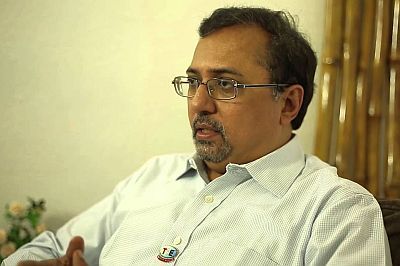'How do you unleash the animal spirits if you chain the animal?'
'Instead of finding the tax evaders, they harass the honest tax payer'
'The perception is that those who do business are doing something not right'
Illustration: Dominic Xavier/Rediff.com

Tax terrorism is the most talked about expression, both openly and secretly in India now.
Chandu Nair, below, an alumnus of Indian Institute of Management-Ahmedabad with three decades of experience as a serial entrepreneur, angel investor, venture capitalist and strategic adviser, talks to Shobha Warrier/Rediff.com on whether wealth creators are being increasingly hounded in India.
Nair, currently a member of The Chennai Angels, says, "It is easier to be a foreign investor in Indian start-ups than an Indian investor in Indian start-ups."
In his letter to his employees, Café Coffee Day founder VG Siddhartha wrote about the way he was harassed by lenders, private equity partners and IT officials. As a serial entrepreneur and angel investor, what do you say about the kind of harassment he spoke about?
I don’t have any direct knowledge of the situation he was in.
I understand that there are a lot of other complications also. So, I don’t want to comment on the specific situation.
At a larger level, I would say entrepreneurs in India, especially start-ups, do not have an easy time.
I speak both as an entrepreneur earlier and an investor now, and also as a facilitator to entrepreneurs.
I am also on the board of a couple of companies.
What has happened in the last few years is that there is a huge distrust between the government and the business community as a whole including the so-called start-ups.
The government somehow feels all businesses are out to deprive it of its rightful share of revenue.
Therefore, the government thinks it is only appropriate to increase the pressure in terms of scrutiny and in terms of regulatory compliances.
The fundamental thing that entrepreneurs need to succeed is predictability.
For business to do consistently well, you need stability and predictability.
For the last several years, that is missing substantially.
Several years, meaning?
It started in the previous UPA regime and got exacerbated in the current BJP regime.
Jokingly, I am not sure if it has, perhaps, something to do with lawyers and people from certain educational institutions becoming finance ministers.
Fact is, nothing is predictable and there is no stability.
It makes doing business in India very, very difficult.
In his Independence Day speech, the prime minister reiterated that doing business in India has become easier. But when you speak to businessmen, they say exactly the opposite…
Yes. I agree with the business community.
 While there have been some attempts at simplifying paper work, on a regular day to day level, it has not changed much.
While there have been some attempts at simplifying paper work, on a regular day to day level, it has not changed much.
For example, as an income tax payer, I am using money I have earned as an entrepreneur and investing in start-ups.
Compared to my counterpart overseas or even the foreign investors investing in India, I am at a disadvantage in multiple ways.
Compared to the rules people have in certain other countries in terms of valuing a company, here the income tax officials value a company in a very rigid way.
For example, the infamous Section 56(2) of the Angel Tax amendment treats the premium on investment in a start-up as income.
It means Rs 100 can effectively become Rs 67 which is a drop of Rs 33.
Today there are a lot of stipulations on who is to be treated as an angel investor and who will not.
If I am part of The Chennai Angels, my investment is considered as eligible but when a mother gives her savings to her son for his start-up, she will not be considered as an angel investor.
If I am willing to take a risk with my own money, who are you to tell me I am not eligible to do it?
On the plus side, Modi has reached out to the world with his idea of ‘Make in India’ and I am told it has generated a fairly positive response from foreign companies.
My point is, on one side, the government says it wants private investment.
On the other, when the private investor comes, you treat him like he is doing some shady business.
Who is at fault? The bureaucracy or the attitude of the government itself?
My personal view is that in terms of orientation, this government is a socialist in the Indira Gandhi, Morarji Desai mould.
That is, according to them, the pie has to be distributed and not expanded.
They believe that it is their duty to redistribute the pie and the focus is not so much as increasing the pie for everybody.
Hopefully, the Independence Day speech of the PM and the review meeting he had with the FM recently should renew the focus on the economy as priority number one.
I feel that this prime minister has a talent deficit in his Cabinet and he over-relies on the bureaucracy.
I have generally distrusted the bureaucracy particularly the IAS and the IRS because they always look for discretionary powers and never want transparency, simplicity and clarity.
As a result, on one side, you have the government which seems to have a left of centre socialist economic policy and on the other side, you have a bureaucracy which is only interested in entrenching itself even deeper.
Today, you have reached a situation where on one side, there is no money in the hands of the consumers and they are postponing expenditure even at the underwear level.
This is a light-hearted indicator created by Alan Greenspan, and if you look at, say, the results of Page Industries, you will see that people are postponing buying a new underwear to four months instead of three months.
Next, the government is not really making it conducive for private investors.
They have created some new tax regulations for foreign portfolio investors because of which they now find it challenging to invest in India.
They are used to the trust structure all over the world and here, they have to change to invest in India. Which is not a desirable situation for them.
If you don’t want people to spend or people to invest, from where do you expect the job opportunities to come?
Look at the jobs you have lost in the automotive sector.
Where is the income going to come from in the hands of the consumers?
So, you feel even when the government wants private investors to invest, it has no trust at all in those who do business?
The perception is that those who do business are doing something not right.
Despite all the talk about start-up India, out of the start-up India fund of Rs 10,000 crore, how much have they disbursed?
Look at how they decide whether it is a start-up. A committee will look at the idea and decide! Do you think people function like this in the US or Singapore?
In which other country, a bureaucrat who has no idea what it means to take a risk, decides the fate of a start up?
How can a bureaucrat or an income tax officer know one is a qualified start-up and the other is not?
Tell me, how do you unleash the animal spirits if you chain the animal?
It is not the Centre alone but the state also has a role in this.
States also have to create a conducive atmosphere for start-ups to flourish.
In fact, many start-ups are being advised, the moment they are ready to get institutional funds, to become a US or a Singapore company and not remain an Indian company.
Has it anything to do with tax terrorism?
One part of it is tax-related issues, the way they are interpreting the law and even the way they are structuring the law.
I must add here that GST will go a long way in formalising the economy in a more structured way, though there are cribs about the way it was implemented, the software glitches etc.
I reckon it might make businesses who are compliant more competitive.
Likewise, the crackdown on shell companies is a welcome step.
The other part is that you make it cumbersome for even the foreign investors to come to India.
What will a start-up do when you create various kinds of problems?
If you look at the distribution of funds, you will see that almost 90 per cent of the money invested in Indian start-ups are not Indian money unlike China.
How many large Indian funds do you have?
Why is it so?
It is easier to be a foreign investor in Indian start-ups than an Indian investor in Indian start-ups.
Is it because every entrepreneur or an investor is looked at with suspicion?
The default approach is suspicion. It has become increasingly the norm.
Next reason is the complicated regulatory regime.
Third reason is the lack of India-based funds. Even the government with a Rs 10,000 crore fund, has not been able to deploy it.
Fourth reason is, barring a few, the state governments are not much bothered about start-ups as much as they are about large ticket projects.
So, because of the socialist mentality, the government prefers to redistribute wealth than encourage wealth creators?
That again is the default Indian political philosophy.
Instead of finding the tax evaders, they harass the honest tax payer.
It appears as if they prefer to squeeze all those who are already in the system over those who are evaders.
Do you feel the present regime at the Centre is more anti-business though they have all these slogans like 'start up India', 'Make in India', etc?
Even during P Chidambaram’s tenure as the finance minister, it was there.
In fact, it was the UPA regime that started most of these things.
They were the ones who created the angel tax.
A few days ago, the prime minister said that those who indulge in tax terrorism would be dealt with harshly. Do you think the atmosphere will change?
These are all nice words to say. I am hoping to see more action on this front.
Yes, they removed some 40-50 officers from the IRS.
But when you give so much discretionary powers in the hands of officers who can interpret the rules in any way they want, you are only creating a very huge bureaucracy with very little accountability.
What do you want actually? You want to encourage private investment, you want to create more small enterprises.
Forty-five per cent of manufacturing and 40 per cent of exports comes from the MSME sector.
It's they who create jobs and not the government or even the large private sector.
And if you make it more and more difficult for them to function, jobs are not going to come.
Unless they simplify regulations so that there is no scope for discretion or interpretation, very little is going to change. Most entrepreneurs do not want any subsidy or concession; they want only stability, clarity and simplicity.
So, the way things stand, you feel becoming a $ 5 trillion economy in the next five years is going to be a distant dream?
I think it is quite a challenge as you need to grow at 12 per cent per year! How is that possible?











 © 2025
© 2025